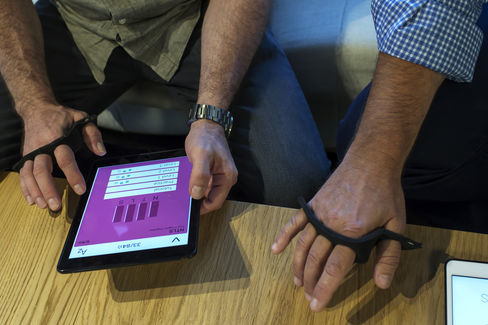Powermat founder wants to save us from keyboards

Ran Poliakin [Ran Poliakine], inventor, founder of Powermat Technologies Inc. , a company that promotes wireless chargers, offers another device to the mobile world. His company Tap Systems is promoting the idea of a new manipulator , which in the future can replace the keyboard, and will be useful to users of both mobile devices and virtual reality.
The soft device is worn on the fingers in the manner of brass knuckles, after which it reads light tapping, which can be done with fingers on virtually any sufficiently hard surface. Tap combinations can be easily turned into letters of the alphabet or other computer control commands transmitted via Bluetooth.
“We invented a smart fabric that, when put on a hand, turns any surface into a keyboard,” explains Polyakin. “This is important - because if you have a smart watch, an iPad, any other device that you need to interact with on the go, now you have to stop and use the keyboard, physical or on-screen.”
')
Tap Systems co-founders are an engineer from NASA and another engineer who founded a successful company and sold it for almost a billion dollars.
Polyakin learned the lessons of market entry for mobile devices from his experience with Powermat Technologies Inc. So far, wireless charging is a lot of exotic, despite being involved in firms like Samsung Electronics Co. (incorporating technology in its products), as well as the Ikea Group (plans to integrate wireless charging into furniture ) and Starbucks Corp (wants to place charges in its coffee houses).
Polyakin believes that the slow progress of the charge is due to the fact that at the time of their appearance the market was not ready for them. It was clear that the market would sooner or later tighten up, but at that moment they were unclaimed.
In the case of Tap, the inventor is confident that the market is ready for such a product. Owners of mobile devices, fans of virtual reality and people with disabilities just still frozen in anticipation of a convenient controller that will save them from the keyboard. Musicians may also be interested in the device if it turns any surface into a piano keyboard.
The obvious drawback of the device is the need to memorize combinations of taps assigned to different characters - after all, ten fingers are not enough for the alphabet. Developers have created a special tutorial to help learn the necessary combinations. Polyakin claims that the average person needs no more than an hour to get used to the new controller.
Source: https://habr.com/ru/post/394187/
All Articles